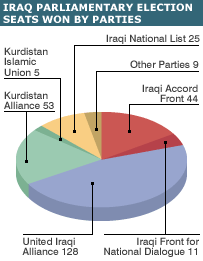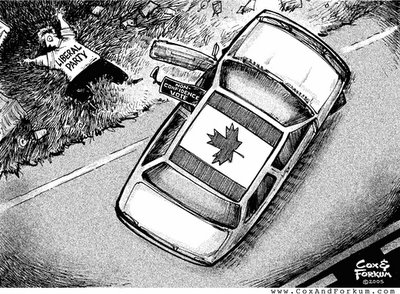ELECTION ROUND-UP
Emanuele Ottolenghi at the National Review Online tries to put a positive spin on Hamas's surprise victory at the Palestinian ballot boxes: Hamas Without Veils:Hamas’s favored outcome was not victory, but a strong showing that would leave Hamas with the best of both worlds: It would remain in opposition (or would be invited to join a coalition as a junior partner) but would impose severe limitations on the Fatah-led government on how to manage its relations with Israel. Hamas could thus claim to reject Oslo, decline to recognize the Palestinian Authority and its commitments under the Oslo accords and the roadmap, and continue to use its rising political clout and its military strength to sabotage any effort to revive the moribund peace process.It's crunch-time for Hamas. Once in Government, any Hamas sponsored attacks on Israel would effectively be a declaration of war. And I don't fancy their chances against Israel.
What victory does to Hamas is to put the movement into an impossible position. As preliminary reports emerge, Hamas has already asked Fatah to form a coalition and got a negative response. Prime Minister Abu Ala has resigned with his cabinet, and president Abu Mazen will now appoint Hamas to form the next government. From the shadows of ambiguity, where Hamas could afford — thanks to the moral and intellectual hypocrisy of those in the Western world who dismissed its incendiary rhetoric as tactics — to have the cake and eat it too. Now, no more. Had they won 30-35 percent of the seats, they could have stayed out of power but put enormous limits on the Palestinian Authority’s room to maneuver. By winning, they have to govern, which means they have to tell the world, very soon, a number of things.
They will have to show their true face now: No more masks, no more veils, no more double-speak. If the cooptation theory — favored by the International Crisis Group and by the former British MI-6 turned talking head, Alistair Crooke — were true, this is the time for Hamas to show what hides behind its veil.
If they are to turn from violence and truly embrace the democratic process, a good place to start would be the wording of their Covenant. Quite how Israel is supposed to negotiate with an organisation that wants to see it destroyed I don't know.
Meanwhile, there was an election in Iraq. Iraq the Model reflects on the outcome:
Reactions to the results announced yesterday varied from one party to another but in general it seems that the results were welcomed outside Iraq more than inside as politicians here re still have the task of looking for a way to form a government that convinces all concerned parties.The BBC has a nice pie chart showing the breakdown of the vote:
The positive thing about those reactions is that objections weren’t as harsh as they were when the preliminary results surfaced. Now, those with objections confirmed that they want to push the political process forward; on al-Hurra, a spokesman of Maram said today that "although we have reservations on the results, we intend to go on with the political process" and this will most likely be enough to cast away the ghost of a bloody conflict we were afraid of.
All are convinced now that solutions lie within politics and negotiations but what concerns us now is that some parties will perhaps keep a high ceiling for their demands. It is true that no single bloc can form a government without forming a coalition with other bloc(s) but the number of seats each bloc got will remain the factor that decides the form of and terms of cooperation despite the calls for forming a government of national unity that overlooks election results and focuses more on dealing with the current challenges and dangers.

As you can see, Iraq the Model's earlier predictions were quite right:
Although the liberal and secular powers aren’t yet ready to take the lead for a number of reasons related to 35 years of oppression and destruction but still, the progress they made in a very short time is impressive and I think their main duty now is to establish balance with the religious parties during the coming four years and I believe we already have a partial balance...With all the fuss over the previous two, you may have missed the third election this week which took place in Canada. 12 years of Liberal government finally came to end with the Conservatives winning 36% of the vote, compared to 30% for the Liberals. In their inimitable style, Cox and Forkum captured the key moment in the Liberal Party's demise last November:

The lack of a clear majority will no doubt frustrate Stephen Harper, the new Prime Minister, but according to this editorial in the WaPo, that's because Canadians still have some reservations about the Conservatives:
Canadians, devoted as always to subtlety and prudence, refused to give Harper a majority. Diane Ablonczy, a Conservative parliamentarian from Alberta, offered a perceptive take on the voters' verdict. She said they "want to test-drive the Conservative Party" before allowing it to govern without help. In stable democracies, voters can take test-drives.I'm not sure that's entirely true - unless Canadians have a special ability to arrange their votes to produce a hung parliament I'd say this vote represents more of a protest at the corruption of the last government than a ringing endorsement of Conservative principles.
Moving on, there were two other elections in the news this week. Firstly, two LibDem candidates managed to cause a commotion in Westminster: Mark Oaten resigned from their front bench over an affair with a rentboy and Simon Hughes managed to tell us all he wasn't gay only to tell us he was gay but not really gay, or something.
Apparently Hughes thought it more decent to lie to the public than to admit having had gay relationships in his past. A strange decision - after all, this is 2006 and if most core Tory voters couldn't give two stuffs about Cameron allegedly experimenting with drugs in his youth, did Hughes really think the voting public would care about who he chose to share his bed with in the past? It's none of our business.
Finally, George Galloway got himself evicted from Celebrity Big Brother. He claimed in his interview with Davina McCall that he'd just lost the last election he'd ever face, suggesting he won't stand as a RESPECT candidate next time round. Probably for the best. The caustic Charlie Brooker gets the last word on this one:
If Galloway wanted to make an impression, he succeeded. And if he wanted the impression to be that of a seething, swaggering, self-important bully, he succeeded spectacularly.Heh.
Because he could've ridden out all the cat stuff, all the dressing-up games. That's easily defused: just chuckle about it in your eviction interview, and hey, it's just a bit of fun. The humiliation would've been real, yet fleeting. What'll stick in people's minds, however, is his jaw-droppingly unpleasant behaviour in the days leading up to his eviction. Rounding on the nice-but-dim youngsters, taunting a recovering alcoholic, spluttering paranoid bile at every opportunity - I mean really. WHAT a tosser.
In PR terms, it's hard to think of anything worse he could've done during his stay in the house. But I'll have a go. He could have 1) masturbated repeatedly on camera, staring the viewer straight in the eye; 2) pooed into a big bowl of flour in the middle of the kitchen; and 3) killed at least nine of his fellow housemates. But those are the only worse things I can think of. He's screwed.
Even so, you've got to hand it to him: when he shoots himself in the foot, he uses a cannon so big it takes his whole leg off.

<< Home